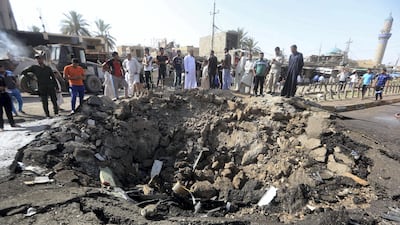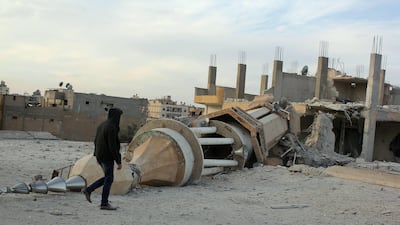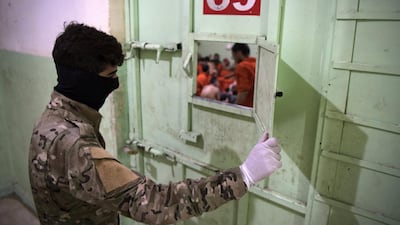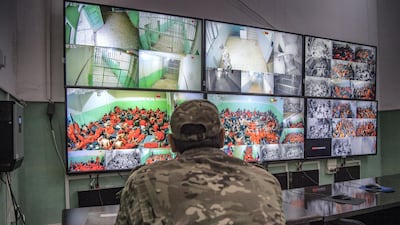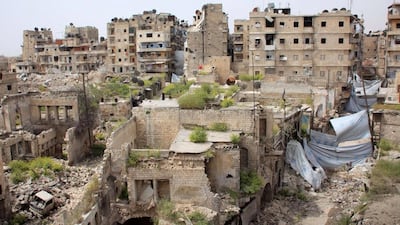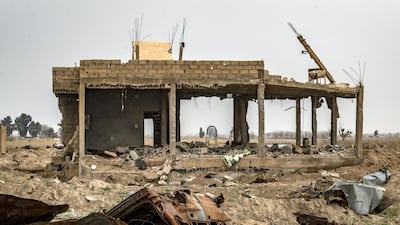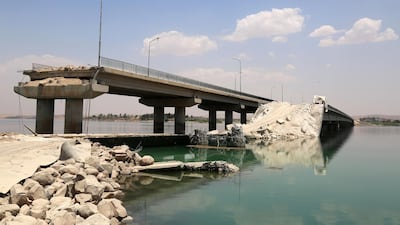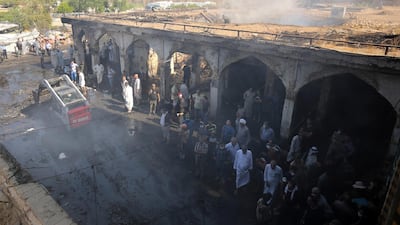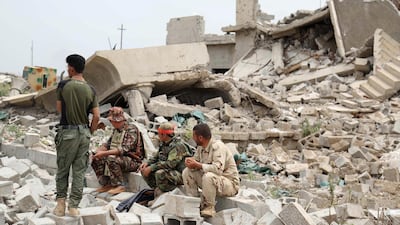Monday marked a hundred days since unidentified gunmen assassinated Hisham Al Hashimi outside his house in Baghdad. The tragic loss of this foremost expert on radical groups, and an adviser to the Iraqi government, dealt a massive blow to the country's academic, social and security institutions. Very few are spared the wrath of violent armed groups, whether they are non-state or state-sanctioned.
The world lost a historian who documented ISIS and the various extremist groups that preceded it (most if not all literature on these topics extensively source Al Hashimi’s works). Iraq lost a sociologist who understood and embraced his country’s complexities. A family lost a loving husband, father, brother and uncle. And many of us lost a good friend.
Aristotle once said: “A friend to all is a friend to none." Had he known Al Hashimi, he would have paused to reconsider his statement. If there was one thing Al Hashimi rejected, it was any ideology that would push human beings to kill one another. And yet, he made friends with anyone, whatever their world view was, so long as they did not resort to violence.
Iraqis come from diverse backgrounds and thinking, many of who may even be at odds with each other. But according to Al Hashimi, most Iraqis rejected, in particular, two extreme but influential ideologies: one that envisions an Islamic state and the return of the Caliph, and the other that calls for an Islamic revolution that eventually places entire states under the influence of a supreme leader. Both of these ideologies, however, espouse violence.
Al Hashimi did not believe a majority of Iraqis subscribed to either world view. And if he met an individual who did, and if he determined that that individual did not mean to physically harm someone else, then to his mind the angry rhetoric and sometimes empty threats amounted to little more than sound bites.
In Al Hashimi’s view, listening to and befriending people of all stripes and reconciling quarreling groups were the only ways to defeat extremists at both ends of Iraq’s unique political and identity spectrums. Maybe he was on to something. It is important to note that in the aftermath of his killing, only two groups of people rejoiced: those who were aligned with ISIS, and those who supported the militias backed by Iran's Islamic Revolutionary Guard Corps and believed to be the prime suspects in his murder.
Al Hashimi was of the firm belief that everyone was redeemable. He was an opponent of what is known today as "cancel culture". Perhaps he projected the swirling dynamics of his own life's trajectory on to a people who have had to deal with the trauma of conflict since the conception of their nation. He found his greatest joy in reconciliation, and that is what he spent a significant amount of his final years working on. He helped turn foes into friends and paved the way for a more unified stance in tackling the many challenges facing the country.
Al Hashimi was an outspoken critic of corruption and kleptocracy but he was not an enemy of the state. In fact, he believed in gradual reform from within the system. Over the past six years, he served as a security adviser to Iraqi President Barham Salih. He engaged with the US Central Command stationed in the country, as well as leaders of the various militias, especially when the threat of ISIS foreshadowed all other problems.
His in-depth knowledge of the ISIS organisation served to understand the group's blueprint. When it lost its territorial control, Al Hashimi wasted little time in warning about an imminent underground resurgence – just in case Baghdad failed to seize the opportunity provided by victory.
Another threat, meanwhile, was looming: the growing pains of the hastily formed Popular Mobilisation Forces, an Iranian-backed umbrella group of militias that the IRGC had infiltrated and dominated. The impunity of some factions within the PMF to commit human rights violations worried Al Hashimi. Living in Baghdad amid their increasingly reckless behaviour warranted caution, and he balanced criticism with sound advice in his dealings with these groups.
There was one occasion when he abandoned this cautious approach – during the anti-government protests that broke out in October 2019. He could not conceal his heartbreak following the loss of young lives in their hundreds. He grew more critical of government orders to crack down on these unarmed protesters, while trying to mediate between the activists and the few "adults" still remaining in the government's backrooms.
It was during these protests when we got a glimpse of Al Hashimi's empathetic side. He spent hours observing the discourse between protesters on social media. He praised their bravery but sent them private messages, dissuading them from making fiery statements that might endanger their own lives.
“People in Tahrir Square are broken today," one friend said in the aftermath of his assassination. "Though hundreds died here, it is like the killing of this one man has casted an unparalleled gloominess. All hope died with Hisham."
A hundred days later, large posters of Al Hashimi remain pasted on walls and tents at the iconic protest venue. Faith in Prime Minister Mustafa Al Kadhimi, who promised reforms and justice, has dwindled significantly. People on the streets know who the killers are, but they also realise that these culprits are more powerful than the justice system and perhaps even the government.
Over the past three months, many people have shared their personal memories of Al Hashimi. “How did he make time for all of us?,” journalist Alison Meuse remarked. This is true. Al Hashimi never left a question unanswered or a message unattended to. He seldom turned away anyone in need of advice or a sounding board. He had a brilliant mind but also a gentle soul. He was down to earth, which is a rarity among security analysts and experts.
Perhaps the most vital lesson for us to learn is his unmatched ability to listen, understand, forgive and befriend. In his view, even those who seemed hopeless deserved a chance
Al Hashimi left behind a treasure trove of writings that will no doubt shed light on some of Iraq and the region’s most pressing security concerns. Many of his works have yet to be published or translated. Friends and colleagues have pledged to make his papers and books accessible to larger audiences who did not get to know him.
He also left us with many fond memories, including lighter moments even as we discussed Iraq’s many ironies, complicated social compacts and delicious cuisines. There was never a dull moment with Al Hashimi. Perhaps the most vital lesson for us to learn is his unmatched ability to listen, understand, forgive and befriend. In his view, even those who seemed hopeless deserved a chance.
In 2016, amid all the anguish and confusion following the ISIS takeover of my hometown Mosul, a Baghdad-based journalist posted on Facebook that the only way to save Iraq was by bombing the city using chemical weapons. In his post, he described children as ticking time-bombs and viruses – were they to be brainwashed by the terror group into taking up their violent cause. I did not take kindly to the post. I was even upset that, rather than scorning him publicly, Al Hashimi reached out to him privately. “He is hurt and confused," he told me. "Words are only words. Talk to him. He would never accept killing civilians, Rasha. Befriend him."
Al Hashimi presumed the best in others, even actively seeking it from them. Only time will tell if that was a blessing or a curse.
Rasha Al Aqeedi is an Iraqi journalist
TWISTERS
Director: Lee Isaac Chung
Starring: Glen Powell, Daisy Edgar-Jones, Anthony Ramos
Rating: 2.5/5
Results
1.30pm Handicap (PA) Dh50,000 (Dirt) 1,400m
Winner Al Suhooj, Saif Al Balushi (jockey), Khalifa Al Neyadi (trainer)
2pm Handicap (TB) 68,000 (D) 1,950m
Winner Miracle Maker, Xavier Ziani, Salem bin Ghadayer
2.30pm Maiden (TB) Dh60,000 (D) 1,600m
Winner Mazagran, Tadhg O’Shea, Satish Seemar
3pm Handicap (TB) Dh84,000 (D) 1,800m
Winner Tailor’s Row, Royston Ffrench, Salem bin Ghadayer
3.30pm Handicap (TB) Dh76,000 (D) 1,400m
Winner Alla Mahlak, Adrie de Vries, Rashed Bouresly
4pm Maiden (TB) Dh60,000 (D) 1,200m
Winner Hurry Up, Royston Ffrench, Salem bin Ghadayer
4.30pm Handicap (TB) Dh68,000 (D) 1,200m
White hydrogen: Naturally occurring hydrogen
Chromite: Hard, metallic mineral containing iron oxide and chromium oxide
Ultramafic rocks: Dark-coloured rocks rich in magnesium or iron with very low silica content
Ophiolite: A section of the earth’s crust, which is oceanic in nature that has since been uplifted and exposed on land
Olivine: A commonly occurring magnesium iron silicate mineral that derives its name for its olive-green yellow-green colour
Fifa Club World Cup quarter-final
Kashima Antlers 3 (Nagaki 49’, Serginho 69’, Abe 84’)
Guadalajara 2 (Zaldivar 03’, Pulido 90')
Superliminal%20
%3Cp%3EDeveloper%3A%20Pillow%20Castle%20Games%0D%3Cbr%3EPublisher%3A%20Pillow%20Castle%20Games%0D%3Cbr%3EConsole%3A%20PlayStation%204%26amp%3B5%2C%20Xbox%20Series%20One%20%26amp%3B%20X%2FS%2C%20Nintendo%20Switch%2C%20PC%20and%20Mac%0D%3Cbr%3ERating%3A%204%2F5%3C%2Fp%3E%0A
Where to donate in the UAE
The Emirates Charity Portal
You can donate to several registered charities through a “donation catalogue”. The use of the donation is quite specific, such as buying a fan for a poor family in Niger for Dh130.
The General Authority of Islamic Affairs & Endowments
The site has an e-donation service accepting debit card, credit card or e-Dirham, an electronic payment tool developed by the Ministry of Finance and First Abu Dhabi Bank.
Al Noor Special Needs Centre
You can donate online or order Smiles n’ Stuff products handcrafted by Al Noor students. The centre publishes a wish list of extras needed, starting at Dh500.
Beit Al Khair Society
Beit Al Khair Society has the motto “From – and to – the UAE,” with donations going towards the neediest in the country. Its website has a list of physical donation sites, but people can also contribute money by SMS, bank transfer and through the hotline 800-22554.
Dar Al Ber Society
Dar Al Ber Society, which has charity projects in 39 countries, accept cash payments, money transfers or SMS donations. Its donation hotline is 800-79.
Dubai Cares
Dubai Cares provides several options for individuals and companies to donate, including online, through banks, at retail outlets, via phone and by purchasing Dubai Cares branded merchandise. It is currently running a campaign called Bookings 2030, which allows people to help change the future of six underprivileged children and young people.
Emirates Airline Foundation
Those who travel on Emirates have undoubtedly seen the little donation envelopes in the seat pockets. But the foundation also accepts donations online and in the form of Skywards Miles. Donated miles are used to sponsor travel for doctors, surgeons, engineers and other professionals volunteering on humanitarian missions around the world.
Emirates Red Crescent
On the Emirates Red Crescent website you can choose between 35 different purposes for your donation, such as providing food for fasters, supporting debtors and contributing to a refugee women fund. It also has a list of bank accounts for each donation type.
Gulf for Good
Gulf for Good raises funds for partner charity projects through challenges, like climbing Kilimanjaro and cycling through Thailand. This year’s projects are in partnership with Street Child Nepal, Larchfield Kids, the Foundation for African Empowerment and SOS Children's Villages. Since 2001, the organisation has raised more than $3.5 million (Dh12.8m) in support of over 50 children’s charities.
Noor Dubai Foundation
Sheikh Mohammed bin Rashid Al Maktoum launched the Noor Dubai Foundation a decade ago with the aim of eliminating all forms of preventable blindness globally. You can donate Dh50 to support mobile eye camps by texting the word “Noor” to 4565 (Etisalat) or 4849 (du).
Fight Night
FIGHT NIGHT
Four title fights:
Amir Khan v Billy Dib - WBC International title
Hughie Fury v Samuel Peter - Heavyweight co-main event
Dave Penalosa v Lerato Dlamini - WBC Silver title
Prince Patel v Michell Banquiz - IBO World title
Six undercard bouts:
Michael Hennessy Jr v Abdul Julaidan Fatah
Amandeep Singh v Shakhobidin Zoirov
Zuhayr Al Qahtani v Farhad Hazratzada
Lolito Sonsona v Isack Junior
Rodrigo Caraballo v Sajid Abid
Ali Kiydin v Hemi Ahio
Results
Stage Two:
1. Mark Cavendish (GBR) QuickStep-AlphaVinyl 04:20:45
2. Jasper Philipsen (BEL) Alpecin-Fenix
3. Pascal Ackermann (GER) UAE Team Emirates
4. Olav Kooij (NED) Jumbo-Visma
5. Arnaud Demare (FRA) Groupama-FDJ
General Classification:
1. Jasper Philipsen (BEL) Alpecin-Fenix 09:03:03
2. Dmitry Strakhov (RUS) Gazprom-Rusvelo 00:00:04
3. Mark Cavendish (GBR) QuickStep-AlphaVinyl 00:00:06
4. Sam Bennett (IRL) Bora-Hansgrohe 00:00:10
5. Pascal Ackermann (GER) UAE Team Emirates 00:00:12
Company%20Profile
%3Cp%3E%3Cstrong%3ECompany%20name%3A%3C%2Fstrong%3E%20myZoi%3Cbr%3E%3Cstrong%3EStarted%3A%3C%2Fstrong%3E%202021%3Cbr%3E%3Cstrong%3EFounders%3A%3C%2Fstrong%3E%20Syed%20Ali%2C%20Christian%20Buchholz%2C%20Shanawaz%20Rouf%2C%20Arsalan%20Siddiqui%2C%20Nabid%20Hassan%3Cbr%3E%3Cstrong%3EBased%3A%3C%2Fstrong%3E%20UAE%3Cbr%3E%3Cstrong%3ENumber%20of%20staff%3A%3C%2Fstrong%3E%2037%3Cbr%3E%3Cstrong%3EInvestment%3A%3C%2Fstrong%3E%20Initial%20undisclosed%20funding%20from%20SC%20Ventures%3B%20second%20round%20of%20funding%20totalling%20%2414%20million%20from%20a%20consortium%20of%20SBI%2C%20a%20Japanese%20VC%20firm%2C%20and%20SC%20Venture%3C%2Fp%3E%0A
SANCTIONED
- Kirill Shamalov, Russia's youngest billionaire and previously married to Putin's daughter Katarina
- Petr Fradkov, head of recently sanctioned Promsvyazbank and son of former head of Russian Foreign Intelligence, the FSB.
- Denis Bortnikov, Deputy President of Russia's largest bank VTB. He is the son of Alexander Bortnikov, head of the FSB which was responsible for the poisoning of political activist Alexey Navalny in August 2020 with banned chemical agent novichok.
- Yury Slyusar, director of United Aircraft Corporation, a major aircraft manufacturer for the Russian military.
- Elena Aleksandrovna Georgieva, chair of the board of Novikombank, a state-owned defence conglomerate.
more from Janine di Giovanni
COMPANY%20PROFILE
%3Cp%3E%3Cstrong%3EName%3A%20%3C%2Fstrong%3EYango%20Deli%20Tech%0D%3Cbr%3E%3Cstrong%3EBased%3A%20%3C%2Fstrong%3EUAE%0D%3Cbr%3E%3Cstrong%3ELaunch%20year%3A%20%3C%2Fstrong%3E2022%0D%3Cbr%3E%3Cstrong%3ESector%3A%20%3C%2Fstrong%3ERetail%20SaaS%0D%3Cbr%3E%3Cstrong%3EFunding%3A%20%3C%2Fstrong%3ESelf%20funded%0D%3Cbr%3E%3C%2Fp%3E%0A
Match info
Uefa Champions League Group F
Manchester City v Hoffenheim, midnight (Wednesday, UAE)
How to report a beggar
Abu Dhabi – Call 999 or 8002626 (Aman Service)
Dubai – Call 800243
Sharjah – Call 065632222
Ras Al Khaimah - Call 072053372
Ajman – Call 067401616
Umm Al Quwain – Call 999
Fujairah - Call 092051100 or 092224411
Key findings of Jenkins report
- Founder of the Muslim Brotherhood, Hassan al Banna, "accepted the political utility of violence"
- Views of key Muslim Brotherhood ideologue, Sayyid Qutb, have “consistently been understood” as permitting “the use of extreme violence in the pursuit of the perfect Islamic society” and “never been institutionally disowned” by the movement.
- Muslim Brotherhood at all levels has repeatedly defended Hamas attacks against Israel, including the use of suicide bombers and the killing of civilians.
- Laying out the report in the House of Commons, David Cameron told MPs: "The main findings of the review support the conclusion that membership of, association with, or influence by the Muslim Brotherhood should be considered as a possible indicator of extremism."
Other acts on the Jazz Garden bill
Sharrie Williams
The American singer is hugely respected in blues circles due to her passionate vocals and songwriting. Born and raised in Michigan, Williams began recording and touring as a teenage gospel singer. Her career took off with the blues band The Wiseguys. Such was the acclaim of their live shows that they toured throughout Europe and in Africa. As a solo artist, Williams has also collaborated with the likes of the late Dizzy Gillespie, Van Morrison and Mavis Staples.
Lin Rountree
An accomplished smooth jazz artist who blends his chilled approach with R‘n’B. Trained at the Duke Ellington School of the Arts in Washington, DC, Rountree formed his own band in 2004. He has also recorded with the likes of Kem, Dwele and Conya Doss. He comes to Dubai on the back of his new single Pass The Groove, from his forthcoming 2018 album Stronger Still, which may follow his five previous solo albums in cracking the top 10 of the US jazz charts.
Anita Williams
Dubai-based singer Anita Williams will open the night with a set of covers and swing, jazz and blues standards that made her an in-demand singer across the emirate. The Irish singer has been performing in Dubai since 2008 at venues such as MusicHall and Voda Bar. Her Jazz Garden appearance is career highlight as she will use the event to perform the original song Big Blue Eyes, the single from her debut solo album, due for release soon.
The%20Hunger%20Games%3A%20The%20Ballad%20of%20Songbirds%20%26%20Snakes
%3Cp%3E%3Cstrong%3EDirector%3A%3C%2Fstrong%3E%C2%A0Francis%20Lawrence%3C%2Fp%3E%0A%3Cp%3E%3Cstrong%3EStars%3A%C2%A0%3C%2Fstrong%3ERachel%20Zegler%2C%20Peter%20Dinklage%2C%20Viola%20Davis%2C%20Tom%20Blyth%3C%2Fp%3E%0A%3Cp%3E%3Cstrong%3ERating%3A%20%3C%2Fstrong%3E3%2F5%3C%2Fp%3E%0A
The specs
- Engine: 3.9-litre twin-turbo V8
- Power: 640hp
- Torque: 760nm
- On sale: 2026
- Price: Not announced yet
How to apply for a drone permit
- Individuals must register on UAE Drone app or website using their UAE Pass
- Add all their personal details, including name, nationality, passport number, Emiratis ID, email and phone number
- Upload the training certificate from a centre accredited by the GCAA
- Submit their request
What are the regulations?
- Fly it within visual line of sight
- Never over populated areas
- Ensure maximum flying height of 400 feet (122 metres) above ground level is not crossed
- Users must avoid flying over restricted areas listed on the UAE Drone app
- Only fly the drone during the day, and never at night
- Should have a live feed of the drone flight
- Drones must weigh 5 kg or less
GOLF’S RAHMBO
- 5 wins in 22 months as pro
- Three wins in past 10 starts
- 45 pro starts worldwide: 5 wins, 17 top 5s
- Ranked 551th in world on debut, now No 4 (was No 2 earlier this year)
- 5th player in last 30 years to win 3 European Tour and 2 PGA Tour titles before age 24 (Woods, Garcia, McIlroy, Spieth)
Australia World Cup squad
Aaron Finch (capt), Usman Khawaja, David Warner, Steve Smith, Shaun Marsh, Glenn Maxwell, Marcus Stoinis, Alex Carey, Pat Cummins, Mitchell Starc, Jhye Richardson, Nathan Coulter-Nile, Jason Behrendorff, Nathan Lyon, Adam Zampa
Wicked: For Good
Director: Jon M Chu
Starring: Ariana Grande, Cynthia Erivo, Jonathan Bailey, Jeff Goldblum, Michelle Yeoh, Ethan Slater
Rating: 4/5
'HIJRAH%3A%20IN%20THE%20FOOTSTEPS%20OF%20THE%20PROPHET'
%3Cp%3E%3Cstrong%3EEdited%20by%3A%3C%2Fstrong%3E%20Idries%20Trevathan%3Cbr%3E%3Cstrong%3EPages%3A%3C%2Fstrong%3E%20240%3Cbr%3E%3Cstrong%3EPublisher%3A%3C%2Fstrong%3E%20Hirmer%20Publishers%3Cbr%3E%3Cstrong%3EAvailable%3A%3C%2Fstrong%3E%20Now%3C%2Fp%3E%0A
Company%20Profile
%3Cp%3E%3Cstrong%3EName%3A%3C%2Fstrong%3E%20Ovasave%3Cbr%3E%3Cstrong%3EStarted%3A%3C%2Fstrong%3E%20November%202022%3Cbr%3E%3Cstrong%3EFounders%3A%3C%2Fstrong%3E%20Majd%20Abu%20Zant%20and%20Torkia%20Mahloul%3Cbr%3E%3Cstrong%3EBased%3A%3C%2Fstrong%3E%20Abu%20Dhabi%3Cbr%3E%3Cstrong%3ESector%3A%3C%2Fstrong%3E%20Healthtech%3Cbr%3E%3Cstrong%3ENumber%20of%20staff%3A%3C%2Fstrong%3E%20Three%20employees%3Cbr%3E%3Cstrong%3EInvestment%20stage%3A%3C%2Fstrong%3E%20Pre-seed%3Cbr%3E%3Cstrong%3EInvestment%3A%3C%2Fstrong%3E%20%24400%2C000%3C%2Fp%3E%0A
What you as a drone operator need to know
A permit and licence is required to fly a drone legally in Dubai.
Sanad Academy is the United Arab Emirate’s first RPA (Remotely Piloted Aircraft) training and certification specialists endorsed by the Dubai Civil Aviation authority.
It is responsible to train, test and certify drone operators and drones in UAE with DCAA Endorsement.
“We are teaching people how to fly in accordance with the laws of the UAE,” said Ahmad Al Hamadi, a trainer at Sanad.
“We can show how the aircraft work and how they are operated. They are relatively easy to use, but they need responsible pilots.
“Pilots have to be mature. They are given a map of where they can and can’t fly in the UAE and we make these points clear in the lectures we give.
“You cannot fly a drone without registration under any circumstances.”
Larger drones are harder to fly, and have a different response to location control. There are no brakes in the air, so the larger drones have more power.
The Sanad Academy has a designated area to fly off the Al Ain Road near Skydive Dubai to show pilots how to fly responsibly.
“As UAS technology becomes mainstream, it is important to build wider awareness on how to integrate it into commerce and our personal lives,” said Major General Abdulla Khalifa Al Marri, Commander-in-Chief, Dubai Police.
“Operators must undergo proper training and certification to ensure safety and compliance.
“Dubai’s airspace will undoubtedly experience increased traffic as UAS innovations become commonplace, the Forum allows commercial users to learn of best practice applications to implement UAS safely and legally, while benefitting a whole range of industries.”
The biog
DOB: 25/12/92
Marital status: Single
Education: Post-graduate diploma in UAE Diplomacy and External Affairs at the Emirates Diplomatic Academy in Abu Dhabi
Hobbies: I love fencing, I used to fence at the MK Fencing Academy but I want to start again. I also love reading and writing
Lifelong goal: My dream is to be a state minister
The Kites
Romain Gary
Penguin Modern Classics
More from Neighbourhood Watch:
Gulf Under 19s final
Dubai College A 50-12 Dubai College B
Springsteen: Deliver Me from Nowhere
Director: Scott Cooper
Starring: Jeremy Allen White, Odessa Young, Jeremy Strong
Rating: 4/5
COMPANY PROFILE
Name: Kumulus Water
Started: 2021
Founders: Iheb Triki and Mohamed Ali Abid
Based: Tunisia
Sector: Water technology
Number of staff: 22
Investment raised: $4 million




















